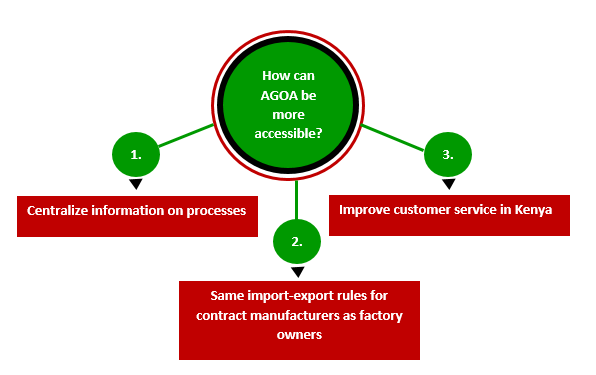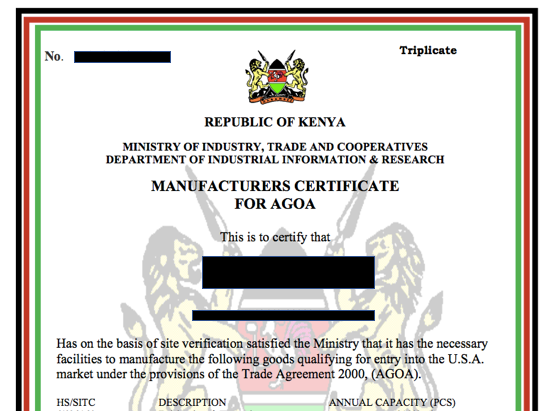We just imported shoes from our 2nd production run into the US. It was not an easy process. So we’re writing our 2nd article in a series that’s looking at how Kenya could improve its ease of doing business.
The big opportunity here is called AGOA. The African Growth and Opportunity Act (AGOA is a US legislation that gives duty-free status to select goods from Sub-Saharan countries, making it easier for entrepreneurs to access the US market. 85% of Kenya’s $389 million AGOA exports is credited to the apparel industry despite the fact that over 7,000 different types of goods/products are eligible. In short, Kenya has barely scratched the surface of AGOA and there, therefore, exists a great opportunity for creating employment.
Here are a few things that can go a long way in making AGOA more accessible:

Process simplification
There are three entities that you’ll deal with when getting certified for AGOA: the Kenya Association of Manufacturers (KAM), the Ministry of Industry, Trade and Cooperatives and the Kenya Revenue Authority. Each plays an important role in the authentication and certification of the products to be exported.
However, since their processes are separate, it is difficult for any of them to evaluate the effectiveness of the entire AGOA process, rather than focusing on their individual segments. For instance, we spent a considerable amount of time getting an AGOA certificate from the Ministry only to be told later by KAM that the AGOA certificate was only for textiles and apparels and we should have gotten the Generalized System of Preference (GSP) certificate instead. The GSP is a preferential tariff system by developed countries for developing countries.
If you’re new to exports, you’ll definitely break a sweat and spend a considerable amount of time understanding what needs to be done. Misinformation from one entity about the role of the other entities may cause unnecessary delays. The solution? An online portal that:
Has an introduction section that summarizes the export process, the forms needed and the main steps to be taken.
Allows a user to follow the progress of their applications as well as giving an opportunity to KAM, KRA and the Ministry to see places where bottlenecks arise for a quick resolution.
The need for holistic efficiency cannot be emphasized enough.
Access to information
There is plenty of information about AGOA but it is scattered amongst the three entities. You basically need to do extra research to make sure you’re on the right path. Luckily for us, we knew about the East Africa Trade and Investment Hub which was super handy in helping us piece the information together, as well as refer us to people who could help. But the entire time, I kept wondering what we could possibly have done had we never heard of the Hub, like so many entrepreneurs I meet who don’t know of its existence. What about businesses that are not based in cities or towns? How can we make this information accessible to all?
In short, information on AGOA should be made available in one central website where effort is made to explain how to access it as well as other preferential tariff markets, including the East Africa Community. InfoTrade Kenya attempts to do this but it’s a website you’ll most likely have to find on your own, i.e., not mentioned by any of the 3 entities, and it also does not provide the realistic details of what to expect when on the ground. The 3 entities in their individual websites have scant information on AGOA, putting the burden on the entrepreneur. To improve ease of doing business, there should never be any burden on the entrepreneur.
‘Shared economies’ is the future
We took a considerably long time to get a certificate of origin because we are a contract manufacturer that is working with a local shoe factory in Kenya. Because the rules for certification didn’t envision this scenario, we again spent a considerable amount of time proving that we were eligible despite not owning the actual factory premises. Further, at the time of incorporation in Kenya, we could not take advantage of the Export Processing Zone (EPZ) Act because even though we were technically doing everything that other EPZ companies were doing, we could not be registered as one because we are contract manufacturers who do not own a manufacturing facility.
Globally, companies like Uber and Airbnb are growing because they realized the untapped opportunities for shared economies, i.e., pay per use without owning the asset. In Kenya, we have the same concept in the informal ‘kadogo’ economy where traders sell items to poor households in portions of what the household needs for that day rather than sell a whole product to them. We have limited it in the informal sector and are yet to harness its potential in manufacturing. There are many entrepreneurs with great manufacturing dreams but without the high capital needed to start manufacturing. Laws and policies should be developed to support this as it is currently stifled.
Quick support to entrepreneurs
I’ve been lucky enough to experience customer service in China and the US. Kenya is relatively behind on this, but that doesn’t mean we can’t improve.
The speed and efficiency in getting things done, e.g., getting shoe parts inspected in China or getting goods through customs is astonishing when compared to Kenya. Time is money and in a competitive global world, it would be hard for Kenyan businesses to compete when so much time and resources are spent understanding or going through processes. There needs to be urgency on the part of all stakeholders to ensure that goods are certified and exported in record time because every delay costs the business its customers or goodwill. The urgency should be driven by a desire to be better and the realization of one’s role as a brush stroke in a masterpiece painting. We can’t beat poverty and unemployment until we understand our individual roles and impact in the entire export ecosystem.
Note: if you are interested in AGOA, here is a great resource from the East Africa Trade Hub to start with: AGOA 101 Kenya, How to export duty-free from Kenya to the U.S. under AGOA.





